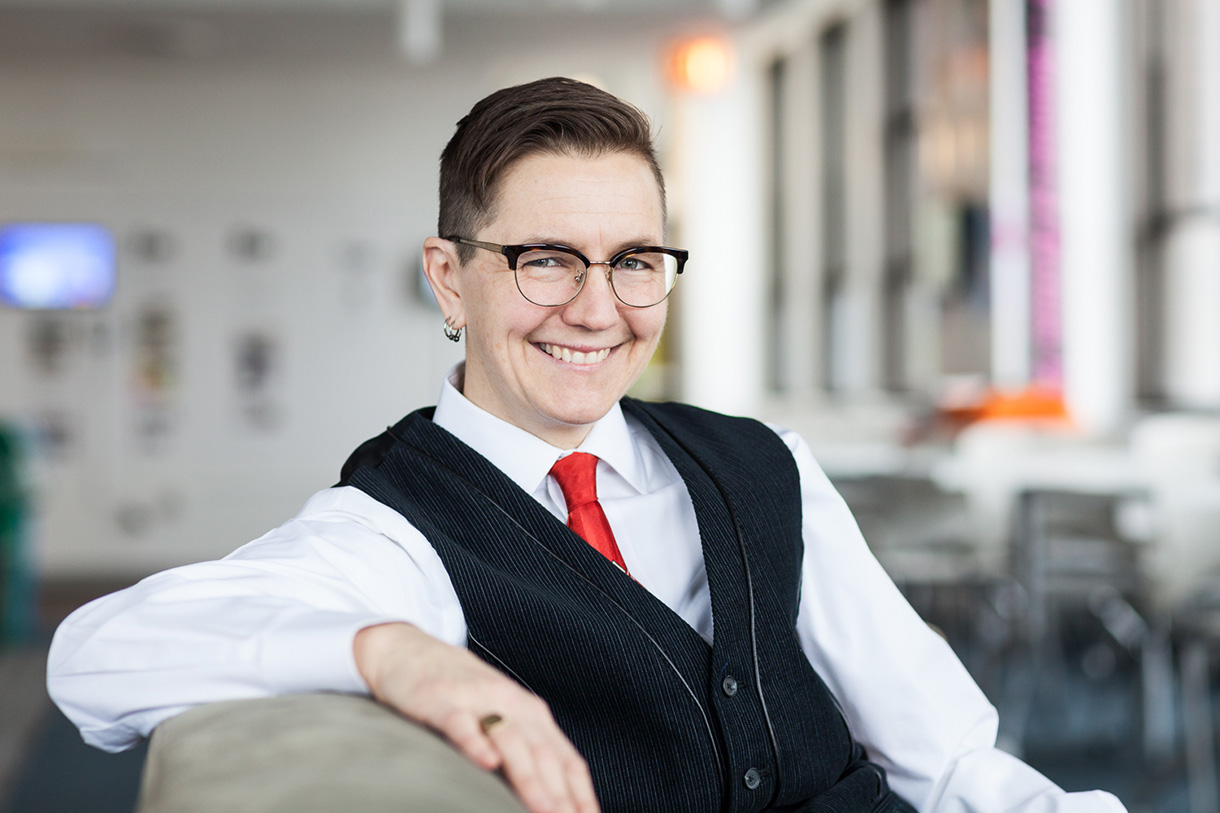Ames Hawkins Appointed Inaugural Faculty Fellow
 Photo: Phil Dembinski (BFA '08)
Photo: Phil Dembinski (BFA '08)Department of English Associate Chair and Professor Ames Hawkins, Ph.D., has been appointed as Columbia College Chicago’s first Faculty Administrative Fellow. In the position, Hawkins will conduct research on national best practices in faculty development and survey the needs of the faculty at Columbia College Chicago, report on those findings, and in collaboration with the Office of the Provost, propose a structure and programming for a comprehensive faculty development center. The Faculty Affairs Committee and the Executive Committee of the Faculty Senate recommended Hawkins to Provost Stan Wearden following a candidate review process.
“Ames is a first-rate scholar with tremendous credentials both internally and externally,” says Wearden. “Creating a plan for a faculty development center is an important objective within the strategic plan, and Ames has established expertise in this area. I am delighted to have the opportunity to appoint Ames to this important leadership position.”
The position is designed to focus on professional development for achievement in scholarly and creative activities; mentoring and evaluation of faculty; curriculum design and pedagogy; technology; student advising; diversity; and community engagement.
Following is a Q&A with Hawkins:
What interests you most about this position?
What I’m most excited about is the possibility of reinvigorating college-wide intellectual conversations about the issues concerning creative and critical practices. I think faculty are hungry to discuss their creative and scholarly work with each other and they are interested in supporting each other. It isn’t that there’s a complete lack of support. It’s that we could do a better job in providing a space for such support and conversation.
What are your primary goals?
This semester, my goal is to listen. My current plan is to meet with every Assistant Professor as I am able and ask how they believe the college does, or in some cases doesn’t, support them in terms of faculty development—most specifically in their movement toward tenure. Right now, we have a center that focuses on teaching, and that’s fantastic. But there are two other areas in which faculty are assessed: creative and scholarly endeavor, and service. I’ll be working with some tools created by the National Organization for Faculty Development and Diversity in order to identify areas where we are doing a good job, as well as areas in which we, as a college, might improve, especially when it comes to providing support for the creative and scholarly endeavor.
Sometimes all we need to do to help someone succeed is ask. It’s of the utmost importance to make sure that our colleagues—ones we’ve most recently hired—feel as though they are really part of the community, one that doesn’t stop at their department door.
I'm also interested in seeing where and how faculty work might intersect. Do they seek more opportunities to collaborate with their colleagues? What form might this take? Are there conversations they would like to have happen at the college? How do they understand their own creative and scholarly research agendas as fitting into their departments and the college as a whole? What do they most like about their jobs?
How will you draw on your experience as an artist, writer and educator into your position?
The most important aspect of my career will be my experience with collaboration. In my time here, I have collaborated in the classroom with ten different faculty members in four different departments other than my own. I believe this experience situates me well to speak with faculty from across the college. I am poised to really listen and understand their concerns.
The goal, of course, will be for me to make recommendations. It’s my intention to provide recommendations based on the findings following one-on-one conversations and engaging research on best practices. In my work, I endeavor to expand the limits by which we identify and define scholarship. And what I’ve found is that the boundaries between these identities aren’t as hard and fast as we sometimes pretend.
**
Hawkins has 25 years of teaching experience and has been at Columbia College Chicago for the past 15 years. Hawkins has a B.A. in American Culture from University of Michigan, M.A. in Popular Culture from Bowling Green State University, and Ph.D. in Composition and Rhetoric with a cognate in Anthropology from Wayne State University. Her current projects include These Are Love(d) Letters: e, l, o, r, s, t, v, a transgenre book-length writing project and art installation and Masters of Text, a scholarly podcast that explores the pedagogical affordances of soundwriting and digital spoken dialogue. According to her website, Hawkins “theorize[s] the power and pleasure of queer(ing) form.” She teaches and co-teaches courses in First Year Writing, Cultural Studies, Literature, and Creative Nonfiction.